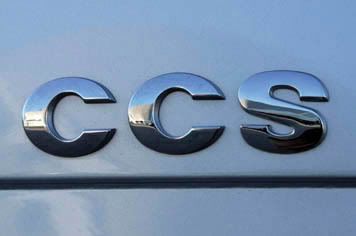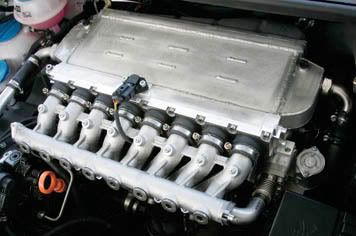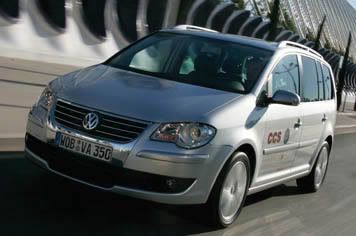Volkswagen lays out plan for a petroleum free future
Posted by Lorenzo at 4:55 pm
Our world is, for the most part, powered by petroleum. There is no escaping this fact. In recent years, the price of petroleum has risen, not to mention its environmental effect. This hike in price has served as a wake up call for our oil-dependent society. Now, we are looking for ways to reduce consumption by looking at alternative sources.
Volkswagen this week has released their road plan for the next 10 years. Their goal is to ultimately implement high temperature fuel cells that use no gasoline whatsoever. Though Volkswagen admits that implementation of fuel cells won't happen till 2020, they are making great strides in producing cleaner, more efficient engines. Volkswagen has always been a proponent of diesel, and as such, many people associate diesel engines with Volkswagens. However, in recent years, Volkswagen has been developing new engines that burn a multitude of alternative fuels such as EcoFuel and SunFuel. In the US, Volkswagen has adopted Bluetec diesel engines. These two developments bring Volkswagen closer to their petroleum free goal. Volkswagen's newest innovation comes in the form of a Combined Combustion System (CCS), which combines the efficiency of a diesel engine with the emission quality of a gasoline engine.
Ultimately, Volkswagen's goal is to have a road going fuel cell car by 2020. They have announced that the first trials of a high temperature fuel cell will begin in 2009. In the meantime, Volkswagen is preparing their first gas-electric hybrid on the Jetta slated for 2008.
Press release and photos after the jump.
Source: Volkswagen AG.
The roadmap to an epoch free of oil
Wolfsburg - Volkswagen’s engine strategy integrates highly innovative technologies on the way via the fuel cell to pure electrical traction.
TDI, TSI and DSG are the most efficient types of powertrains today.
Clean TDI engines will satisfy the strictest emissions laws in the world.
CCS will prove to be a key technology for a society independent of oil.
High temperature fuel cells could deliver a breakthrough for engines powered by hydrogen at the end of the next decade.
Fossil fuels must be utilized as efficiently as possible
BLUETEC and Clean TDI
SunFuel® could already replace gasoline and diesel even today
SunFuel® as basis for the engine of the future: CCS
Wherever it makes sense Volkswagen will also utilize hybrid technology
High temperature fuel cell points the way to the future
Volkswagen assumes that the first prototypes with high temperature fuel cells will begin trials in 2009. The first production vehicles, based on current forecasts, will not arrive on the market before the year 2020. The route we take to get there will not just be contested in the arena of hybrid vehicles.
The terms FSI, TDI, TSI and DSG are registered trademarks of Volkswagen AG or other companies of the Volkswagen Group in Germany.
Volkswagen this week has released their road plan for the next 10 years. Their goal is to ultimately implement high temperature fuel cells that use no gasoline whatsoever. Though Volkswagen admits that implementation of fuel cells won't happen till 2020, they are making great strides in producing cleaner, more efficient engines. Volkswagen has always been a proponent of diesel, and as such, many people associate diesel engines with Volkswagens. However, in recent years, Volkswagen has been developing new engines that burn a multitude of alternative fuels such as EcoFuel and SunFuel. In the US, Volkswagen has adopted Bluetec diesel engines. These two developments bring Volkswagen closer to their petroleum free goal. Volkswagen's newest innovation comes in the form of a Combined Combustion System (CCS), which combines the efficiency of a diesel engine with the emission quality of a gasoline engine.
Ultimately, Volkswagen's goal is to have a road going fuel cell car by 2020. They have announced that the first trials of a high temperature fuel cell will begin in 2009. In the meantime, Volkswagen is preparing their first gas-electric hybrid on the Jetta slated for 2008.
Press release and photos after the jump.
Source: Volkswagen AG.
The roadmap to an epoch free of oil
Wolfsburg - Volkswagen’s engine strategy integrates highly innovative technologies on the way via the fuel cell to pure electrical traction.
TDI, TSI and DSG are the most efficient types of powertrains today.
Clean TDI engines will satisfy the strictest emissions laws in the world.
CCS will prove to be a key technology for a society independent of oil.
High temperature fuel cells could deliver a breakthrough for engines powered by hydrogen at the end of the next decade.
- Growing shortages of fossil fuels and an environment that needs protecting more than ever before, all set new challenges for automobile producers of a magnitude unheard of in the past. At the same time however it is precisely these challenges that can conceal undreamt of opportunities. That is because the roadmap to the future of individual mobility will be defined over the next decade. An exciting future. Companies like Volkswagen will be the driving force behind this progress. These are large companies whose growth in an era of fossil-based resources was fueled by their products yet also created the potential for overcoming dependency on these non-renewable resources by long-range research. One thing is that is already clear today is that in the future a number of systems will coexist side-by-side. Dr. (Engineering) Rudolf Krebs, Director of Volkswagen Powertrain Development comments: “I am firmly convinced that both today’s technologies and those currently in development such as TDI, TSI and DSG will endure for a long time. Advanced internal combustion engine developments, in part supported by e-motors, pure e-powertrains and fuel cells will coexist side-by-side to satisfy all customer wishes.” At the end of this evolutionary chain there is one goal, as already mentioned: Independence from fossil-based resources.
Fossil fuels must be utilized as efficiently as possible
- In the first stage on the path to this independence what is important is to utilize existing fossil fuels as efficiently as at all possible. This first stage represents the foundation of the automotive needs pyramid. It is the era in which gasoline and diesel engines are made, by means of intelligent downsizing, to utilize fuels as economically and with as few emissions as possible while simultaneously offering a full measure of dynamics and comfort. This is the present, today. Volkswagen is putting its mark on the present with vehicles like the Polo BlueMotion, the most fuel-efficient five-seater in the world, a universally fuel-efficient fleet of TDI engines, highly efficient and unique TSI engines (twin chargers) in the Golf und Touran, successful natural gas vehicles (EcoFuel) and a range of models that still leaves plenty of room for fulfilling automotive dreams.
BLUETEC and Clean TDI
- These base technologies are already being further refined. New powertrains, including the engine concept developed by Volkswagen under the working title “Clean TDI” for use in the USA, are already in the prototype stage. These engines will satisfy the strictest emissions laws in the world – even the so-called Tier2 Bin5 in California. The “Clean TDI” engines are an important component of the BLUETEC Offensive kicked off at the end of November in Los Angeles by the three German car producers Audi, Mercedes-Benz and Volkswagen. The goal of this partnership is to establish the BLUETEC concept as a universal symbol for clean and fuel efficient cars and SUVs with diesel engines. By the way, the first Clean TDI celebrated its world premiere in the Tiguan concept car that was presented in parallel to the BLUETEC Offensive at the Los Angeles Auto Show.
SunFuel® could already replace gasoline and diesel even today
- The next important step on the way to the future is obtaining fuels from renewable raw materials. SunFuel that is produced from biomass and cellulose-ethanol is a second generation biofuel. The focus here has shifted specifically to the use of CO2-neutral biomass feedstocks that can be used to generate these synthetic fuels. Because SunFuel® is produced from renewable raw materials such as biomass, when it is burned the amount of carbon dioxide released is equivalent to the amount originally removed from the atmosphere by the plants supplying the energy. When used as a fuel in conventional diesel engines, the extremely high-grade and clean SunFuel® reduces particulate emissions by almost 30 percent and can also be used in older vehicles without technical modifications. Moreover, simple adjustments to the engine controller (ignition timing and injection volume) are sufficient to also reduce NOx emissions (nitrogen oxides) by up to 30 percent.
SunFuel® as basis for the engine of the future: CCS
- Simultaneously SunFuel® is the internal combustion fuel for the next stage of powertrain and fuel strategy that involves using entirely new combustion engines that can be run with renewable fuels and used worldwide without requiring any larger modifications to the infrastructure. The reason: By applying the principles of homogenization the highly pure SunFuel® paves the way for intensive advanced development of the diesel combustion process leading to the combined combustion system (CCS). Synthetic fuels like SunFuel® help to prepare the way for an upcoming generation of engines – and a key technology on the road toward the end of the oil age. That is because CCS will combine the superior fuel efficiency of a diesel engine with the exhaust gas quality of a gasoline engine.
Wherever it makes sense Volkswagen will also utilize hybrid technology
- The current priority, because it is more effective, is to offer large numbers of TDI and TSI engines at economical prices to realize their immediate benefits with regard to oil consumption and emissions. However, along the path to the future Volkswagen will continue to research and further develop all potential engine types and introduce them as soon as it makes sense and is technically feasible. These include hybrid powertrain systems, such as the one Volkswagen presented very recently in the form of a Touran prototype with its highly efficient combination of a gasoline engine derived from the TSI engine, electric drive and dual clutch transmission (DSG).
High temperature fuel cell points the way to the future
- The extent of Volkswagen’s innovative power in researching new technologies becomes apparent when one considers the fuel cell. Volkswagen Research has developed a high-temperature fuel cell (HTFC) in a form that is unique worldwide. It overcomes the numerous disadvantages of previous low-temperature fuel cells (LTFC) that are implemented in nearly all vehicle types with this type of powertrain system; mid-term plans for production vehicles with such systems are currently being announced by some car producers in publicity surrounding the Los Angeles Auto Show. Prof. Dr. Jürgen Leohold, Director of Volkswagen Corporate Research: “The high-temperature fuel cell will make the total system in the car lighter, more compact, durable and economical. And those are the decisive criteria for advancing the fuel cell in the direction of large-scale production.” Prof. Dr. Leohold continues: “We believe that the future belongs to the high temperature fuel cell. On the other hand, we do not give much credence to the chances of the low temperature fuel cell.”
Volkswagen assumes that the first prototypes with high temperature fuel cells will begin trials in 2009. The first production vehicles, based on current forecasts, will not arrive on the market before the year 2020. The route we take to get there will not just be contested in the arena of hybrid vehicles.
The terms FSI, TDI, TSI and DSG are registered trademarks of Volkswagen AG or other companies of the Volkswagen Group in Germany.














<< Home